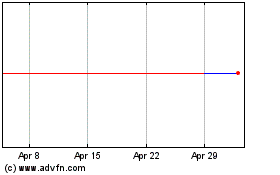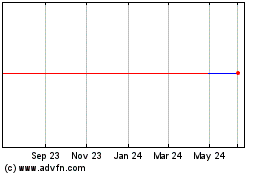By William Boston
This article is being republished as part of our daily
reproduction of WSJ.com articles that also appeared in the U.S.
print edition of The Wall Street Journal (April 30, 2020).
BERLIN -- Two of Germany's largest car makers said Wednesday
that the worst of the economic impact from the novel coronavirus
was yet to come, after reporting sharp falls in earnings, revenue
and new-car sales for the first three months of the year.
After a battering in the first three months, Volkswagen AG and
Daimler AG said they expect to post losses for the second quarter,
showing how hard manufacturers have been hit by the economic
shutdown to contain the pandemic. The auto makers also hinted at
how slow the recovery to precrisis levels will be for an industry
that was facing shrinking global demand and escalating costs long
before the health crisis started.
"The second quarter is going to be the worst," Volkswagen Chief
Finance Officer Frank Witter told reporters. "Financially, it will
be the worst quarter during the course of the year."
Volkswagen has taken the lead in calling on the German
government to introduce new incentives for consumers to trade in
old diesel and gasoline-powered models for new ones in addition to
existing subsidies to purchase electric vehicles.
German auto makers suspended swaths of production in Europe, the
U.S. and China for weeks after the Covid-19 disease spread across
the world. Both Volkswagen and Daimler saw earnings plunge in the
quarter as a result.
Net profit at Daimler, which makes Mercedes-Benz cars, fell to
EUR94 million ($101.9 million) in the first quarter from EUR2.1
billion the year before.
Volkswagen, the world's largest auto maker by sales, said net
earnings fell to EUR405 million in the first three months from
EUR2.9 billion in the same quarter a year ago. Production in the
first quarter fell 25% to just under two million vehicles.
Auto makers have begun restarting their factories, but at just a
fraction of precrisis production levels.
After barely making a profit in the first three months of the
year, Daimler expects to post its first quarterly loss since 2009
in the second quarter because of production stoppages and weak
demand in Europe and the U.S., company officials said.
"It is not possible to make a reliable forecast for 2020,"
Daimler Chief Executive Ola Källenius said.
Auto-industry suppliers, too, are bracing for a steep fall in
demand.
Robert Bosch GmbH, the privately held maker of products ranging
from auto parts to washing machines, forecast a 20% decline in
global auto production this year and said it was delaying
investment, reducing staff working hours and salaries and cutting
executive salaries.
"We are bracing ourselves for a global recession that will also
have a considerable impact on our own performance in 2020," Bosch
CFO Stefan Asenkerschbaumer said in a statement.
European auto makers and their suppliers have furloughed more
than a million auto workers across the Continent. Even as factories
begin to reopen, most are operating at a fraction of their previous
output levels, and the impact on employment remains uncertain.
Volvo Cars, the Swedish auto maker owned by China's Zhejiang
Geely Holding Group, said it would lay off 1,300 white-collar
employees from a workforce of 24,000 people in Sweden.
"The coronavirus means that it's even more important to change
rapidly, and doing it by voluntary redundancies will not be fast
enough," Volvo CEO Hakan Samuelsson said in a statement.
As the virus spread in Europe and the U.S. in February and
March, it was beginning to recede in China, the world's biggest car
market by sales. Auto makers, including Daimler and Volkswagen,
have reopened their plants in China and are gradually reviving
output, but demand for new cars and production remain well below
levels at the same time last year.
Volkswagen said in its first-quarter report that "positive
impulses came from the developing economic recovery in China." But
Mr. Witter said the company still expects to report a pretax loss
for three months to the end of June.
Still, the damage to the auto industry from slumping demand and
efforts to contain the virus by locking down large parts of the
global economy is widespread and could be long-lasting.
Ford Motor Co. this week reported a $2 billion pretax loss in
the first quarter, which it attributed to the impact of the
pandemic on its global business. Nissan Motor Co., Japan's
second-largest auto maker after Toyota Motor Corp., said Tuesday
that it expected to report a net loss, its first in more than a
decade, of up to $885 million in its fiscal year that ended on
March 30.
As global auto sales slump, auto makers are cutting expenses and
securing loans to ensure that they have sufficient cash to weather
the coming months should demand fail to return to precrisis levels
and the economic slump worsen.
Daimler, which has been bleeding cash as a result of big
investments in new technology, said the outflow of capital worsened
in the first quarter, as negative cash flow in its industrial
businesses widened to EUR2.3 billion in the first quarter.
Volkswagen reported negative cash flow of EUR2.5 billion in the
first quarter, but said net liquidity had risen 11% in the same
period to EUR17.8 billion.
U.S. auto maker Ford said it has about $35 billion in cash,
which it described as sufficient to weather the storm for
months.
Write to William Boston at william.boston@wsj.com
(END) Dow Jones Newswires
April 30, 2020 02:47 ET (06:47 GMT)
Copyright (c) 2020 Dow Jones & Company, Inc.
Mercedes Benz (PK) (USOTC:DMLRY)
Historical Stock Chart
From Mar 2024 to Apr 2024

Mercedes Benz (PK) (USOTC:DMLRY)
Historical Stock Chart
From Apr 2023 to Apr 2024
